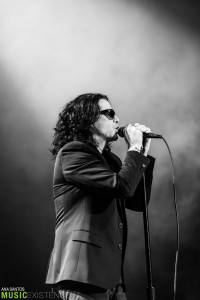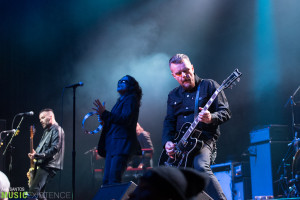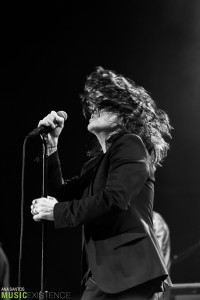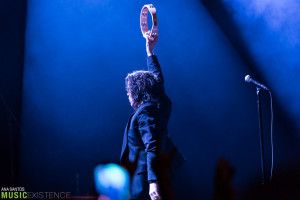Stemming from the embers of British post-punk in the early 80’s, The Cult achieved worldwide success in a fairly quick amount of time. The release of 1985’s Love brought us “She Sells Sanctuary,” 1987’s Electric climbed higher with “Love Removal Machine” and 1989’s Sonic Temple by far outdid all prior chart peak positions with “Fire Woman.” It seemed The Cult was on an unstoppable climb to the top when tensions within the band and lukewarm reception of subsequent records Ceremony (1991) and The Cult (1994) prompted a seven-year hiatus.
The Cult was one of those vacillating household names during my formative music years. Too young to truly appreciate the brilliance behind the music in the early 90’s, I had a lot of catching up to do once the band was reborn in 2001 with Beyond Good and Evil. Although I must admit, it wasn’t until the release of 2016’s Hidden City that the spark was rekindled with renewed enthusiasm and a deeper appreciation of the The Cult’s endlessly evolving sound.
And that was how I found myself sitting in a car underneath the noonday sun on an otherwise uneventful Friday afternoon, speaking with Cult co-founder and frontman Ian Astbury. It wasn’t long before I realized that the mere 15 minutes I had requested would simply not be enough. What little time I did have was spent with Astbury painting a vivid picture of The Cult’s evolution through an iconic 30+ year career.
* * *
Music Existence: Hidden City has been out for a little over a year now, and in preparing for this interview I looked over a series of reviews. It seems that to this day, The Cult continues to mystify some critics. I feel like that’s been a staple of your career. Does it ever get frustrating?
Ian Astbury: [laughs] Yeah, that’s definitely been the theme since day one. ‘Why is he talking about these things? Why does this stuff fascinate him? Why can’t we penetrate it?’ Because it’s not to be penetrated—it’s to be experienced. A lot of it can’t be articulated; it has to be experienced. I mean, it’s almost like it puts them out of a job—the music critics. And then there’s that question of the credentials, you know. Perhaps it’s easier to pull something apart than to look at yourself and take ownership of your own internal world—your internal experiences as a human being—and pull apart other people’s work. It’s like, do your work. And I think that’s confounding for a lot of critics because some of the subject material that’s presented [and] the different layers within our music that’s evolved. By all standards, bands aren’t supposed to evolve in the way we’ve evolved. Very few have evolved beyond a certain period. They park the car at some point. Rinse and repeat, you know? It’s so formula, rinse and repeat. And that was never on the cards for me.

I walked out on my first band and we hadn’t even made a record. We recorded one single and I decided that it wasn’t going to go where I wanted it to go. As much as I loved the guys in the band, I didn’t feel like it was going to stay together. We had four strong personalities pulling in four different directions. And it was obvious we couldn’t hold a sentence together. And perhaps with Billy [Duffy], when I started working with Billy I saw in Billy a guy that was way more grounded, way more pragmatic, way more rooted in, you know—vision. Especially being a guitar player, you know. Billy really stayed with guitar. That’s his main instrument. That’s him. He’s not the type of guy who’ll turn around and jump on a piano or use a different instrument. And that kinda really gave me a much more grounded space that allowed The Cult to evolve the way it has.
I mean, in some way I think we’re kind of late bloomers. Songwriting is something we had to learn because we were a performance-based band. You’ve got three chords. There’s not much you really need to do when you’ve got three chords. You can jump up there and perform and it becomes performance space—the primal energy when you’re writing music. That’s why those songs sound like that. They’ve got three chords and more rhythmic drumbeats or tribal drums. It was an easy thing to do. But then you get into the craft of songwriting, which is something you learn over a period of time, and that’s a whole other area of self-analysis and exploration. Trial and error. And that just confounds—[laughs] Like, ‘why can’t these guys just stay put,’ you know? I understand that.
That actually brings me to the next question: You’ve always experimented with your sound and have had a number of lineup changes, but you’ve always stayed true to yourself.
I mean the core of The Cult is Billy Duffy and Ian Astbury.
Right.
It’s by misadventure. I honestly don’t feel like bands are supposed to stay together. I mean marriages barely stay together. Think about being in a band. Relationships—I’m sure everyone out there has had more than one partner in their lives. So to keep a partnership like Billy and I [have] takes a lot of work. You really have to work at it to get better at listening to each other and try to find that harmonic balance where it does work. And that’s spending some time apart as well. That really helps the relationship. Because when you come back you have something to bring back into the relationship.

Whereas if you’re living constantly on top of each other, which is what touring does—you’re living in a very confined space 24/7—you’re really on top of each other and that is a very difficult environment. And also, you know, people have different lifestyle choices. Some people make some more detrimental lifestyle choices. The Cult—the line up? Some people just couldn’t hack the pressure of the road, especially through the first decade of the band. We were touring and recording nonstop maybe the first 12 years of the band. We were recording and touring nonstop. From like ’83 through ’95 it’s nonstop. We recorded six or seven albums and toured extensively. We were barely off the road. And that’s a lot of wear and tear on a person as well. You kind of have arrested development, I mean you grow up in a hermetically sealed bubble and every time you go out into the real world, you get this shock of everyday life and then you go back on the road and it’s just chaotic. Adrenals are depleted every evening. You leave it on stage. [That’s] the relationship you have with the audience and you know that’s act one. Act two you get a little bit more experience and you start considering songwriting as an option. [Laughs] I think our songs have evolved; our songwriting has evolved. Probably more so in the last three albums.
And I imagine you’re most excited about playing the new material even though old fans are always looking forward to the classic songs – the big hits.
Hits and classics—I think all these terms are redundant. To me it’s like we’re no longer in the music industry, we’re in the lifestyle industry. It’s a lifestyle. Everything from going to the supermarket to going to the gas station—everything’s automated. It’s all becoming a homogenized experience. Fast fashion. Fast music. Albums that are made with twenty producers. Eight writers on a song. We’re in this completely different paradigm. So, for fans of traditionally based bass, drums, guitars and vocals, it’s obviously a different space. But we’ve both incorporated those technological advances into our style and that’s reflected in how we convey what we do.
I think because we are performance-based, we are very much aware of being in the present. Going out and playing live, you want to put together a set that really works in that moment. Works for you, where you’re at, your station in life. Obviously you’re drawn to material that’s most recent because that’s the most recent version of where you’re at. But also, some songs have a rejuvenated energy. Like “[She Sells] Sanctuary” for example, is a song that every time we play it, we play it differently. The different rooms, the different environment, the different day, and it’s actually what you bring to it. There’s so many different interpretations of that song, it’s like a mantra. It’s always rejuvenating. And the songs we bring in and out of the set to keep the set—the core of the set—vibrant and healthy so we can put on a show that really works that evening. We’re very conscious about certain songs that are very near and dear to people. I listen to what people say, but I am one of two. [laughs] I can be a bit more flexible in some ways because I’m not playing an instrument.

With technology, you can change up things with programming. It’s pretty easy to change your sound, change your bank or whatever on the keyboard, you know. But with guitar—the Gretsch White Falcon is such an iconic instrument. And Billy’s got these incredible tones that’s his sound and he doesn’t flit about, hits a pedal and suddenly sounds like an orchestra. He’s a really physical player and that’s a really intimate thing and that keeps The Cult in a certain space. But by adding keyboards, that’s really enhanced the perspective, the sonic picture of the band. If you listen to our records, we have the ambient guitars and we use different instrumentation throughout. I mean, especially on this record. There’s more piano on this record. I honestly feel like the songs that are more like three-chord bass primal throw-down songs, which are the energetic high points in the set, it really holds them in a space where they’re so much more impactful. Those songs really stand out and those moments really stand out. I mean, you don’t see a boxing match where the boxer is constantly punching; you just don’t see that. Unless they’re rotated in and out like ice hockey or basketball where the players take breaks. But you can’t keep going like that. You’re constantly on. If you’re constantly on, playing a set of 15 songs of three-chord bass—you’d be leaving in a body bag. [laughs] You’d be exhausted; it’s physically impossible. And it’s also one-dimensional. I think if you make love like that, it’s pretty boring for your partner.
I actually caught two of your shows last year and was stoked to see such a diverse crowd. There’s obviously the old-school fans, but there also seems to be a new wave of younger fans. What is it like to see fresh blood, if you will, coming out to the shows?
Fresh blood? [Laughs] Fresh blood. I don’t view it like that. I mean, I just view people as people. We definitely have fans that have been with us through a minute but we don’t discriminate. There isn’t some kind of Cult fan. If you connect with the music, you’re very welcome to come to our shows. We don’t require you to have a dress code or an orientation code or a social demographic. You don’t have to present your tax returns when you come to a Cult show. It’s definitely an experience. We live in a very diverse society so that thrills me to look out [over] my audience and see a real cut of society and everybody seems to get on very well at our shows.

In our earlier days of the show, we were in a very volatile environment. I was coming out on stage wearing a whole lot more makeup, way more inciting and there would definitely be a section of the audience that were coming to see this guy coming out way more theatrical in terms of the way I looked and dressed. And they wanted to provoke that, try to get on the stage and you know—there were definitely more violent encounters to the shows. Everything that could have happened did happen. It seemed to threaten a lot of people, what we did initially. That wasn’t the intention but there was definitely a core of our audience that felt the same way we did. We came out of an audience, we came out of punk rock, we came out of post-modern music. We were in the audiences and we formed bands and that was one of the great moments of punk rock.
* * *
After a spin around the world made up of headlining dates and opening slots on arena stages with Guns n’ Roses, The Cult is back for a second Hidden City North American tour this spring. And while it’s a modestly quick tour at 17 dates spanning the month of May, it includes some noteworthy Monster Festival appearances like Carolina Rebellion and Rocklahoma.
Live 17 A Return to Hidden City Tour Dates:
May 3 – Rams Head Live, Baltimore MD
May 5 – Carolina Rebellion, Concord NC
May 6 – Harrah’s, Atlantic City NJ
May 7 – College Street Music Hall, New Haven, CT
May 9 – Zeiterion Performing Arts, New Bedford MA
May 10 – Brooklyn Steel, Brooklyn NY
May 12 – Goodyear Theater at East End, Akron, OH
May 13 – The Venue at Horseshoe Casino, Hammond IN
May 14 – The Pageant, St. Louis MO
May 16 – House of Blues, Dallas TX
May 18 – House of Blues, Houston TX
May 19 – IP Casino Studio A, Biloxi MS
May 20 – Jefferson Theater, Beaumont TX
May 23 – Selena Auditorium, Corpus Christi, TX
May 24 – Aztec Theater, San Antonio TX
May 25 – Strand Theater, Sheveport LA
May 27 – Rocklahoma, Pryor OK
 Music Existence Because of Music, We Exist
Music Existence Because of Music, We Exist